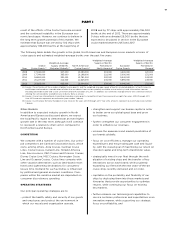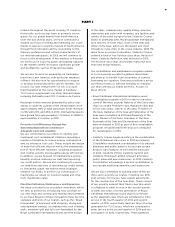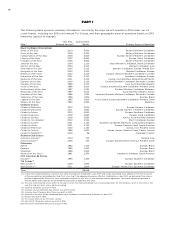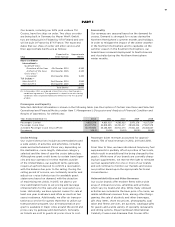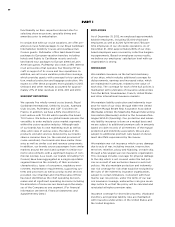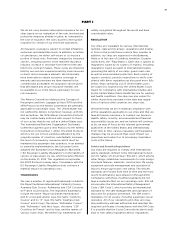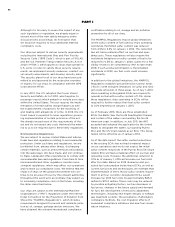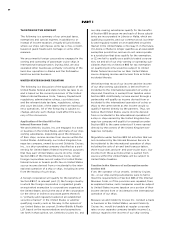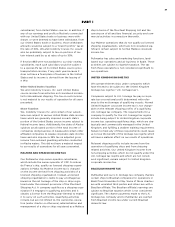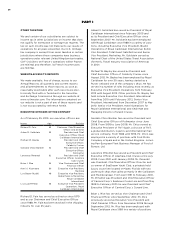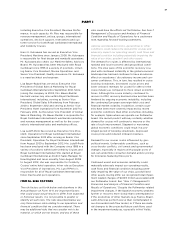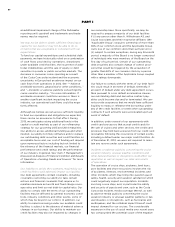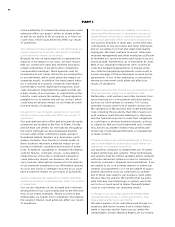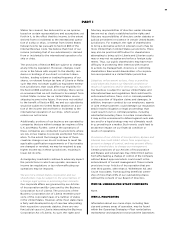Royal Caribbean Cruise Lines 2012 Annual Report Download - page 27
Download and view the complete annual report
Please find page 27 of the 2012 Royal Caribbean Cruise Lines annual report below. You can navigate through the pages in the report by either clicking on the pages listed below, or by using the keyword search tool below to find specific information within the annual report.
23
PART I
In July 2011, new MARPOL Regulations introduced
mandatory measures to reduce greenhouse gas emis-
sions. These include the utilization of an energy effi-
ciency design index (EEDI) for new ships as well as
the establishment of an energy efficient management
plan for all ships. The EEDI is a performance-based
mechanism that requires a certain minimum energy
efficiency in new ships. These regulations became
effective on January 1, 2013. We do not anticipate that
compliance with these regulations will have a material
effect on our operating costs.
We are required to obtain certificates from the United
States Coast Guard relating to our ability to satisfy
liability in cases of water pollution. Pursuant to United
States Coast Guard regulations, we arrange through
our insurers for the provision of guarantees aggre-
gating $349.4 million as a condition to obtaining the
required certificates. The cost of obtaining these
guarantees does not have a material effect on our
operating costs.
Labor Regulations
The International Labour Organization, an agency of
the United Nations that develops worldwide employ-
ment standards, has adopted a new Consolidated
Maritime Labour Convention (the “Convention”). The
Convention, which will be effective starting in August
2013, reflects a broad range of standards and condi-
tions to govern all aspects of crew management for
ships in international commerce, including additional
requirements not previously in effect relating to the
health, safety, repatriation, entitlements and status of
crewmembers and crew recruitment practices. Each
of our Flag States will be required to enact legislation
prior to August 2013 that includes standards at least
as stringent as those set forth in the Convention.
As of the date of this report, this legislation has not
been finalized. Assuming that the Flag States do not
impose regulations that materially differ from the
Convention requirements, we do no anticipate that
our compliance costs will be material. There can be
no assurances, however, that the Flag States will not
seek to adopt additional requirements that could
require us to incur unanticipated material expenses.
Consumer Financial Responsibility Regulations
We are required to obtain certificates from the United
States Federal Maritime Commission relating to our
ability to satisfy liability in cases of non-performance
of obligations to guests, as well as casualty and per-
sonal injury. Pursuant to the United States Federal
Maritime Commission regulations, we arrange through
our insurers for the provision of guarantees in the
amount of $15.0 million for each of our two U.S. ship-
operating companies, Royal Caribbean Cruises Ltd.
and Celebrity Cruises Inc. and a bond in the amount
of $15.0 million for one of our U.K. ship operating
companies, as a condition to obtaining the required
certificates. In February 2013, the United States
Federal Maritime Commission approved amendments
to the performance bond requirements that will
increase the required guarantees to $30.0 million per
operator ($90.0 million in the aggregate) over a two-
year phase-in period. Once phased-in, the guarantee
requirements will be subject to additional consumer
price index based adjustments. The new rules will
become effective in the first quarter of 2014. We do
not anticipate that compliance with the new rules will
have a material effect on our costs.
We are also required by the United Kingdom, Norway,
Finland, and the Baltics to establish our financial
responsibility for any liability resulting from the non-
performance of our obligations to guests from these
jurisdictions. In the United Kingdom we are currently
required by the Association of British Travel Agents
to provide performance bonds totaling approximately
£32.1 million. The Norwegian Travel Guarantee Fund
requires us to maintain performance bonds in varying
amounts during the course of the year to cover our
financial responsibility in Norway, Finland and the
Baltics. These amounts ranged from $4.9 million to
$18.8 million during 2012. We are also required to pay
to the United Kingdom Civil Aviation Authority a non-
refundable levy of £2.50 per guest where we arrange
a flight as part of the cruise vacation.
Certain other jurisdictions also require that we estab-
lish financial responsibility to our guests resulting
from the non-performance of our obligations; how-
ever, the related amounts do not have a material
effect on our costs.
Regulations Regarding Protection
of Disabled Persons
In 2010, the United States Department of Transporta-
tion issued regulations (the “New ADA Regulations”)
addressing various issues applicable to passenger
vessels under the American with Disabilities Act (the
“ADA”). Part I of the New ADA Regulations, which
include required reservation policies for disabled
guests and requirements for aids and services to dis-
abled passengers, became effective in January 2011.
We believe we are in compliance with Part I of the
New ADA Regulations and did not need to make any
material expenditures to comply. Part II, when issued,
is expected to address physical accessibility standards.
While we believe our vessels have been designed and
outfitted to meet the needs of our disabled guests,
we cannot at this time accurately predict whether we
will be required to make material modifications or
incur significant additional expenses in response to
Part II of the New ADA Regulations.


